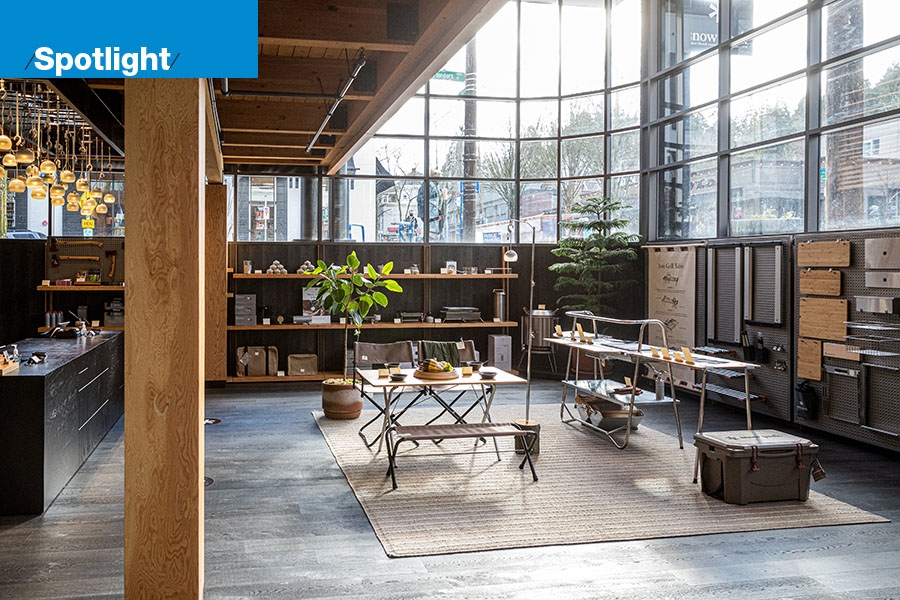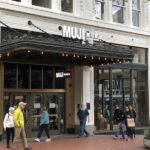Brick-and-mortar retailers reinvent what it means to go shopping.
When the Japanese outdoor-lifestyle brand Snow Peak was designing its new flagship Portland store on Northwest 23rd Avenue, the company knew it wanted a beautiful space with enough elbow room for customers to try out the gear.
From titanium backpacking sporks and portable grills to fireside camp chairs, much of Snow Peak’s core product line focuses on elegantly designed equipment for people to make and enjoy meals together outdoors. It is “the foodiest brand in the outdoor industry, and the outdoorsiest brand in the food industry,” says Matt Liddle, the company’s chief operating officer in the U.S.
So the next logical step for its flagship store and U.S. headquarters was, of course, a restaurant. And not just any restaurant, but the sort that would make shopping and dining at Snow Peak a destination event.
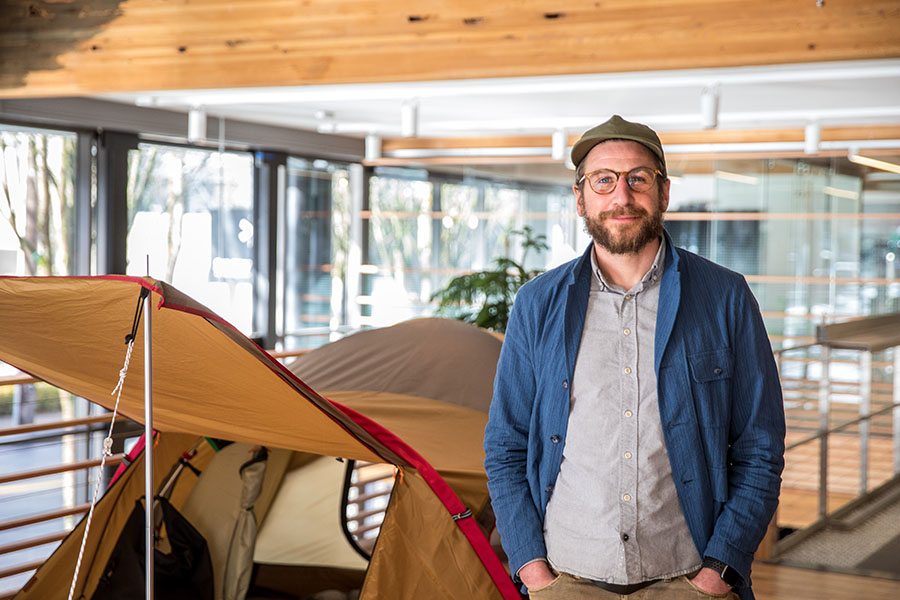 Matt Liddle, Snow Peak’s chief operating officer in the U.S.
Matt Liddle, Snow Peak’s chief operating officer in the U.S.
“Snow Peak is a gathering brand,” Liddle says. “We make things for people to come together in nature. And when people come together inside or outside, usually what they want to do is share food and drink. It was kind of a no-brainer for us to say, ‘Hey, well, if we want to bring the Snow Peak experience and point of view to life in the heart of the city, we’ve got to put a culinary concept together.’”
Takibi, the Japanese word for bonfire, is set to open in May. Outside, there is a 1,800-square-foot outdoor patio. Inside, a wood-burning oven and an open-concept kitchen re-create the warmth of gathering around a campfire to prepare and eat a meal.
The restaurant, inspired by Japanese izakaya — roughly translated as a spot to grab a drink, settle in and get comfortable — will be operated by Submarine Hospitality, the restaurant group behind Portland’s Tusk and Ava Gene’s.
At a time when consumers have grown accustomed to buying nearly everything online, retailers large and small are on the hunt for destination experiences that, as it becomes safer to venture out, will lure people back into brick-and-mortar stores. Restaurants are one such option.
Department stores in their heyday had restaurants, and some, like Nordstrom, still offer coffee shops. Ikea has its Swedish meatballs. And one of the appeals of shopping malls, even as they evolve, is the food court.
But outdoor retailers are especially hands-on. Whether it is an orienteering lesson at REI or a yoga class at Prana or Patagonia, outdoor retailers have long used classes to gather like-minded customers in a place where they can also peruse — and perhaps buy — the store’s offerings.
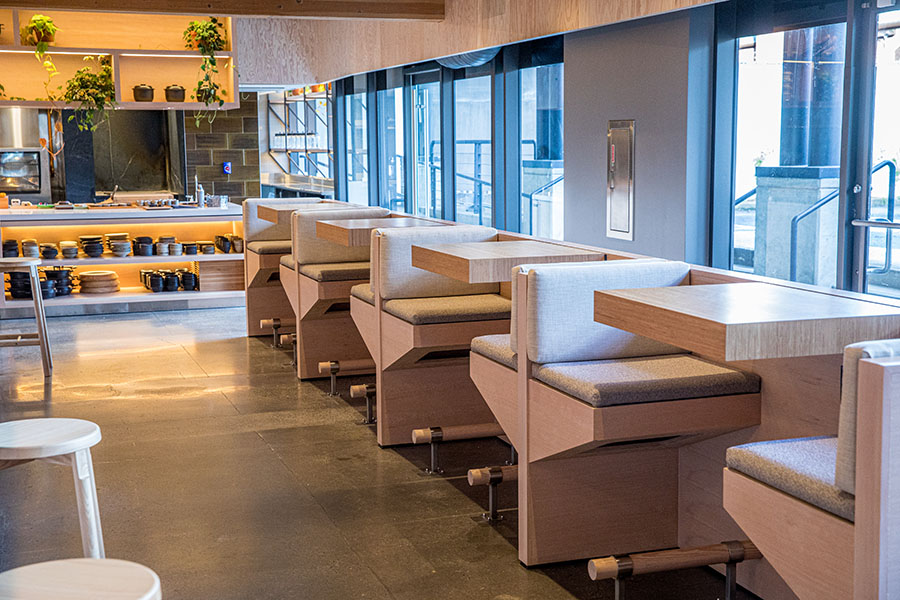 Tabiki restaurant, inside Snow Peak
Tabiki restaurant, inside Snow Peak
Retail analysts say that people will continue to expect the convenience they grew accustomed to during the pandemic, including curbside pickup and speedy, reliable delivery and free returns.
But post-pandemic, smart retailers are also creating destination shopping experiences around their brands, whether it is dining, a fitness class or a carefully curated collection of vintage home goods.
Michael Brown, a partner in the consumer and retail practice of the global strategy and management consulting firm Kearney, says that retailers that want to make a splash post-pandemic must open flagship stores. Not only are they billboards for the brand, but they are “big, bold, experience-based stores in markets where the consumer, when they want to come shop in that store on a Saturday or Sunday, can spend a lot of time there and experience the brand to its fullest,” he says.
Liddle says Snow Peak began planning for a new store and restaurant well before the pandemic, which delayed Takibi’s opening. But once the restaurant is officially open, the company hopes dining will be a large part of Snow Peak’s post-pandemic expansion plans in other U.S. cities. The company did well during the pandemic, in part because of the national resurgence in camping.
Any future in-store restaurants in other parts of the U.S. will be about creating an opportunity for customers to have an immersive experience with the brand, Liddle says.
“In many ways, sitting in the restaurant is spending an hour or two with Snow Peak, which is probably longer than the typical customer would spend just shopping for gear,” Liddle says. “It’s a chance for us to try out a new brick-and-mortar retail format with hospitality and gear and apparel all under one roof.”
Minus the food, Nike has also experimented with new brick-and-mortar formats that get shoes and apparel direct to consumers quickly, while still offering a unique shopping experience. Earlier this year, the company opened one of its first Nike Live stores in Eugene.
Nike calls the small-format stores “digitally led retail concepts.” The store’s stock is driven by what people are ordering online in the community, but Nike also releases new items in-store each week. And because the store is in Eugene, Nike also stocks exclusive University of Oregon gear.
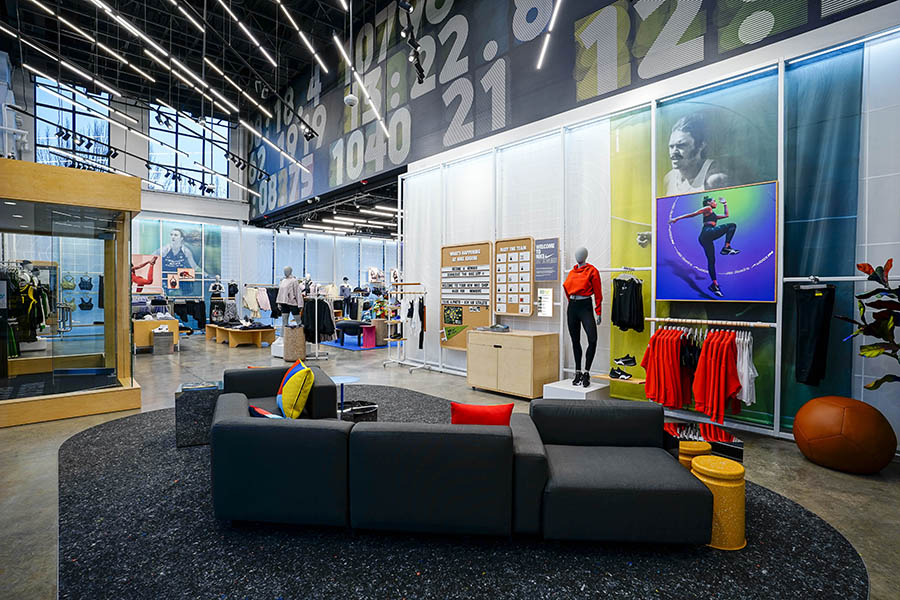 Nike Live store in Eugene Photo courtesy of Nike
Nike Live store in Eugene Photo courtesy of Nike
As it opens more such stores in communities worldwide, the company says it anticipates it will be able to improve its ability to ship directly from its stores, speeding up delivery.
The new concept is a nod to the idea that people might want to shop in many different ways, including curbside pickup. But they also might crave community around their pursuits, which is why the Nike Live store in Eugene has space for local running groups and athletes to gather in person when it is once again appropriate to do so.
“Retailers are trying to figure out how to give people more reason to be at their store,” says Karen BuSteed, a senior vice president at the Portland office of JLL, a real estate and investment company.
JLL’s forecasting report for 2021 notes that without office workers and large-scale tourism, urban retail nationwide “experienced unprecedented challenges in 2020.” Portland was no exception to that national trend, with a downtown emptied of workers by the pandemic.
BuSteed says that national investors have been spooked by broken windows, graffiti and boarded-up storefronts in the wake of protests against police violence.
“Even though that scenario is dramatically impacting the downtown market, it hasn’t dramatically impacted everything outside the downtown market,” BuSteed says. “It’s almost life as usual.”
BuSteed says she expects in the coming year to hear about more progress on two experiential retail projects stalled by the pandemic: a reimagining of Washington Square mall in Tigard; and a deal she worked on to turn the former Nordstrom department store at Lloyd Center into a Live Nation performance venue. She is also eager to see how Portland restaurants emerge out of the pandemic.
“We have a lot of very entrepreneurial-driven chefs in the Portland market,” BuSteed says. “The demand is 100% there. We hope you see the bravery and the fortitude and the capital come back to all of those fantastic chefs that we have. That was really such an underlying current and drive and experience in the Portland market.”
The JLL retail forecast also held out hope for optimism. “As people increasingly become more comfortable conducting regular day-to-day activities and adapt to social practices, such as social distancing, urban retailers must be prepared for the return of the in-person consumer,” the report finds.
Consumers with money to spend will continue to do so online. But after more than a year of forgoing indoor dining at restaurants or making most purchases online, they will crave novelty as the nation emerges from the pandemic.
“It was something we all took for granted before,” says Stephanie Sheldon, who for the past 14 years has owned Noun, a gift, jewelry and home store that sells new and vintage products on Southeast Belmont Street in Portland.
Sheldon’s store had a limited online presence before the pandemic, in part, she says, because part of the fun of shopping at Noun was the experience of being in a tactile, expertly curated and artistic environment. In the store, customers could see vignettes that allowed them to visualize what items would look like in their own home.
That is difficult to replicate online, Sheldon says. Noun also offers a very intentional shopping experience that does not translate well to online. The store does not issue refunds, only exchanges or store credit.
Sheldon closed her brick-and-mortar store to visitors until Black Friday, and with the help of her two part-time employees, accelerated Noun’s online presence. The store also kept its inventory lean, negotiated a 50% cut in rent with its landlord, and applied successfully for a PPP loan. Sheldon also accessed her savings.
While they were closed, they repainted and reconfigured the layout of the store so that it was safer for customers to enter. Only four customers can enter at a time. But when she re-opened, regulars were thrilled to return. They told her that online “was great but nothing like coming into the store.”
“Even now we don’t know what the future holds,” she says. “We’re still totally patching things together. I can’t believe we’re still open.”
To subscribe to Oregon Business, click here.


